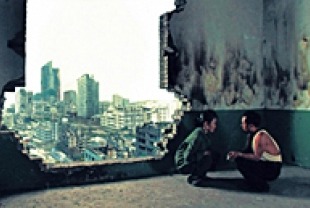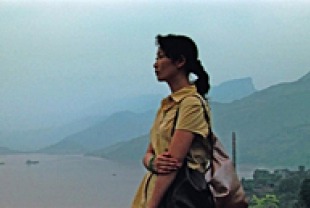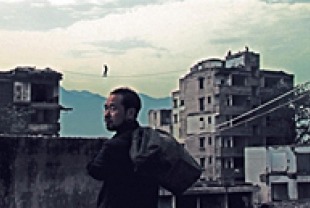Sanming (Han Sanming) is a humble coal miner from Shanxi who spends five days traveling to Fengjie, a town on the Yangtze River that is being demolished to make way for the Three Gorges Hydro Project which is building a dam that will leave a 400 mile long lake behind it, forcing the relocation of more than one million people. Sanming wanders through the town as buildings are being torn down all around him. He is looking for his wife, a paid-for bride who left him 16 years ago. They had a daughter and he wants to see her. Only trouble is that the street where his ex-wife used to live is now underwater. Sanming finds lodging in a decrepit old building which looks like it is ready to crumble at any minute. He finally tracks down his ex-wife's brother and learns she is working on a boat. But she is not ready to see him. Sanming decides to take a job with a demolition crew in order to make some money and stay active.
Shen Hong (Zhao Tao), a nurse from Taiyuan, arrives in Fengjie to locate her husband Guo Bin (Li Zhu Bing), who hasn't been in touch with her for two years. She manages to find a friend of his who is helping to excavate priceless artifacts from the city that date back nearly 2000 years ago. Guo Bin is a very busy men involved in big deals. One evening he is showing some clients around and by a message on his cell phone is able to have a large bridge over the Yangtze lit up at night. Shen Hong finally meets with him and says that she has fallen in love with another man and wants a divorce.
Still Life, which won the Golden Lion at the 2006 Venice Film Festival, is a visually stunning movie. Writer and director Jia Zhangke (Unknown Pleasures, The World) has a keen sense of the fragility of relationships and the impermanence of life. His philosophical perspective is revealed in this quotation:
"I once walked into someone's room by accident and saw dust-covered articles on the desk. Suddenly it seemed the secrets of still life fell upon me. The old furniture, the stationary on the desk, the bottles on the windowsills and the decorations on the walls took on an air of poetic sorrow. Still Life represents a reality that has been overlooked by us. Although time has left deep marks on it, it still remains silent and holds the secrets of life. I entered this condemned city with my camera and I witnessed demolitions and explosions. In the roaring noise and fluttering dust, I gradually felt that life really could blossom in brilliant colors even in a place with such desperation."
For Buddhists one of the foundations of meditation is an acceptance of impermanence. Nothing lasts and every aspect of life is fleeting. We see this understanding in every scene in this extraordinary film where buildings are falling down in a heap on the ground and people are gathering their possessions and moving from one place to another. Change is the order of the day in Fengjie where all bets are on tomorrow and the past is just some ruins that can be tossed aside. Director Zhang-ke also explores the fragility of the marital bond in the lives of the coal miner and the nurse who want to renegotiate these relationships.
Still Life tutors us in the art of letting go as we watch a city vanishing before our eyes and see that relationships can change in the blink of an eye and leave us lost and lonely. The writer and director also includes several inexplicable scenes that are meant to dazzle and mystify us. They do and are all part of this artful and philosophical film.
Special DVD features include an additional film by director Jia Zhangke — "Dong" and an interview with the director.


